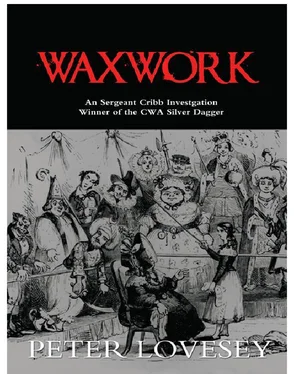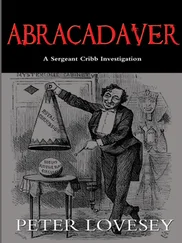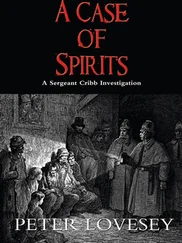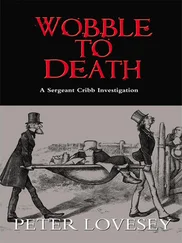Peter Lovesey - Waxwork
Здесь есть возможность читать онлайн «Peter Lovesey - Waxwork» весь текст электронной книги совершенно бесплатно (целиком полную версию без сокращений). В некоторых случаях можно слушать аудио, скачать через торрент в формате fb2 и присутствует краткое содержание. Жанр: Исторический детектив, на английском языке. Описание произведения, (предисловие) а так же отзывы посетителей доступны на портале библиотеки ЛибКат.
- Название:Waxwork
- Автор:
- Жанр:
- Год:неизвестен
- ISBN:нет данных
- Рейтинг книги:3 / 5. Голосов: 1
-
Избранное:Добавить в избранное
- Отзывы:
-
Ваша оценка:
- 60
- 1
- 2
- 3
- 4
- 5
Waxwork: краткое содержание, описание и аннотация
Предлагаем к чтению аннотацию, описание, краткое содержание или предисловие (зависит от того, что написал сам автор книги «Waxwork»). Если вы не нашли необходимую информацию о книге — напишите в комментариях, мы постараемся отыскать её.
Waxwork — читать онлайн бесплатно полную книгу (весь текст) целиком
Ниже представлен текст книги, разбитый по страницам. Система сохранения места последней прочитанной страницы, позволяет с удобством читать онлайн бесплатно книгу «Waxwork», без необходимости каждый раз заново искать на чём Вы остановились. Поставьте закладку, и сможете в любой момент перейти на страницу, на которой закончили чтение.
Интервал:
Закладка:
There was no need to reach a decision yet about how to end the letter. It would have to wait until he heard something definite from the Sheriff of London. Then he would copy it out in his best hand and decide whether he wanted to remain a humble servant.
What mattered more was the price. He was thinking he might ask twenty for the clothes, which was twice what the Sheriff would pay for the hanging. Twenty was not exorbitant when you reckoned the numbers who would pay to look at the figure.
Twenty would cover the cost of what he had in mind to do in London and leave some to spare.
The prisoner Cromer was a deep one, her wardresses had decided. They had confidently expected trouble from her when the truth of her situation had sunk in. The way it took prisoners was variable; all you could count on was that there would be incidents in the first forty-eight hours, anything from fainting-fits to assaults on the staff. The doctor generally gave them something. If they were bad enough they were put in the infirmary for a spell. Once the first crisis was over, they would weep for a day or two and then begin to come to terms with their sentence. Provided visitors did not excite them, they were manageable after that. Passive almost to the finish. A few actually went to that without a murmur.
Cromer had given no indication of mental turmoil. She appeared to be in command of herself. It was as if Newgate had not touched her yet. In prison uniform, the coarse blue jacket and limp linsey skirt, the plain white mob cap with close-fitting frills, she should have looked like any other felon. She did not. She was different.
The clothes fitted well enough. She wore the cap exactly as prescribed, with the ends tied in a bow under her chin. If a strand of gold hair slipped loose she was swiftly ordered to tuck it out of sight. Her sleeves were neatly rolled in regulation fashion. Really there was small scope for self-expression in the uniform, and any signs of it were soon corrected.
Her strangeness was of a more elusive kind, not definable as a breach of prison regulations, but flagrant in a way that offended the wardresses because they were not able to exercise control over it. She accepted the restrictions, the indignities, the scrubbing-brush and the latrine-bucket, without a syllable of protest. She was scrupulously subordinate in her dealings with the staff. Yet she remained remote. The privations should have made her increasingly dependent on her gaolers; it was a process so predictable that they took it as a right. Deprived of it, they could not understand how this prisoner could be simultaneously submissive and indifferent. Certainly there were indications of strain in her features, but she persisted in her aloofness. Her eyes showed no more interest in her attendants than the furniture or the walls.
The governor had noticed it. On Monday, Cromer’s fourth day in Newgate, he had asked for her to be brought to his rooms as was his custom with newly admitted prisoners. Hawkins and Bell had taken her. It meant walking to the other end of the prison through low stone passages, relics of the eighteenth century, never progressing far before an iron-bolted door had to be unlocked and slammed with a resounding crash after they were through.
There was a door beyond which you found yourself stepping on carpet instead of stone. Far from producing an impression of comfort, it was so alien to the rest of Newgate that it disturbed even the wardresses. Bell’s knees turned to jelly every time.
In the carpeted passage they stopped at a panelled oak door with brass fittings polished to military standard. It was Hawkins who knocked.
‘Enter.’
The governor’s room was vast. Vast, that is, compared with cells thirteen feet by seven and corridors so narrow that in places two people could not pass without one stepping aside. The sense of space was unnerving.
It was panelled in dark wood and furnished with high-backed leather chairs. There were bookshelves to the ceiling, pictures of hunting scenes, stuffed animals’ heads and green velvet curtains. It was warm, so there was no fire burning. The governor was facing a tapestry firescreen.
‘If you please, sir, the prisoner Cromer,’ the less nervous wardress announced from the doorway.
‘Yes.’ He turned, a grey-haired man with a waxed moustache and blue, watery eyes. ‘Step forward, Cromer.’ His voice was strange to the ear, modulated by carpets and furnishings.
The prisoner took two steps towards him.
‘Over here, if you please. I may be fearsome, but I am not dangerous, I assure you.’
The wardresses watched her approach to within a yard of him, her face raised to meet his. She was not fearful. Not in the least.
‘I make a point of seeing each prisoner who enters Newgate,’ he told her in a voice just audible across the room, ‘and I always begin by making it clear that this institution and others like it exist only to meet the requirements of the law. For that reason I shall say nothing about the events that brought you here. They were the subject of your trial and I imagine you would not care to be reminded of them. My responsibility is to see that the sentence of the law is carried out-to a point, that is. The ultimate responsibility rests with the Sheriff of the City of London. If your sentence is confirmed by Her Majesty I shall be required to deliver you to the Sheriff for the implementation of that sentence. A formality that you need not concern yourself with, unless it comforts you to know that we in Newgate are responsible only for your custody, not, do you understand …?’
‘I understand.’
Bell caught her breath. The prisoner had failed to address him properly.
The governor fingered the knot of his necktie. ‘You will wish to know how long you may expect to spend in Newgate. The period prescribed by the Home Office is a little over two weeks. Three Sundays must elapse since the day on which sentence was passed. Assuming there is no intervention’-he crossed the room to his desk-‘I must deliver you to the Sheriff shortly before eight in the morning on, er … ’ He picked up a piece of paper and studied it.
‘Monday, 25th June,’ said the prisoner.
There was a sepulchral silence in the room.
The governor put down the paper and stood looking at her. From his expression, he was more surprised than annoyed by the interruption. He returned to the fireplace. ‘Doubtless you are resting your hopes on a reprieve.’ His eyes turned to a small plaster bust that stood on the mantelpiece. ‘The Sovereign has been known on occasions to exercise clemency on the recommendation of the Secretary of State for the Home Office. My advice to you, for what it is worth, is to put all such thoughts out of your mind. I have had the unhappy duty of meeting a considerable number of people in circumstances identical to yours at this moment. I have observed that those who endure the experience best are the ones who reconcile themselves to meeting their Maker. The prison chaplain, Father Hughes, is already known to you. I urge you to be guided by his spiritual advice. You are a member of the Church, I trust?’
She nodded.
‘Good. Then I hope you will unburden your soul to him.’
She said nothing. She had said nothing, either, to the chaplain each time he had visited her in the cell. The tracts he had given her were unopened. The wardresses knew and no doubt the governor knew as well, but he did not press the matter.
‘You may also receive visits from your next of kin. That would include your husband, father, mother-’
‘My parents are dead.’
‘Cromer, it is customary to address me as “sir”. I am sorry about your parents. However, it must be a consolation that they were spared the distress of this time. If you have brothers or sisters-’
Читать дальшеИнтервал:
Закладка:
Похожие книги на «Waxwork»
Представляем Вашему вниманию похожие книги на «Waxwork» списком для выбора. Мы отобрали схожую по названию и смыслу литературу в надежде предоставить читателям больше вариантов отыскать новые, интересные, ещё непрочитанные произведения.
Обсуждение, отзывы о книге «Waxwork» и просто собственные мнения читателей. Оставьте ваши комментарии, напишите, что Вы думаете о произведении, его смысле или главных героях. Укажите что конкретно понравилось, а что нет, и почему Вы так считаете.












